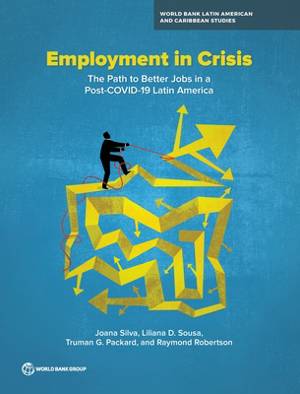
- Afhalen na 1 uur in een winkel met voorraad
- Gratis thuislevering in België vanaf € 30
- Ruim aanbod met 7 miljoen producten
- Afhalen na 1 uur in een winkel met voorraad
- Gratis thuislevering in België vanaf € 30
- Ruim aanbod met 7 miljoen producten
Zoeken
Omschrijving
A region known for its volatility, Latin America and the Caribbean (LAC) has suffered severe economic and social setbacks from crises-including the COVID-19 pandemic. These crises have taken their toll on careers, wage growth, and productivity. Employment in Crisis: The Path to Better Jobs in a Post-COVID-19 Latin America provides new evidence on the effects of crises on the region's workers and firms and suggests several policy responses that can bolster long-term and inclusive economic growth. This report has three key findings. First, crises lead to persistent employment losses and accelerate structural changes away from the formal sector. This change occurs more through reductions in the creation of formal jobs than through job destruction. Second, some workers recover from crises, while others are permanently scarred by them. Low-skilled workers can suffer up to a decade of lower earnings caused by crises, while high-skilled workers rebound fast, exacerbating the LAC region's high level of inequality. Formal workers suffer smaller employment and wage losses in localities with higher rates of informality. And the reduced job flows caused by crises decrease welfare, but workers in localities with more job opportunities, whether formal or informal, bounce back better. Third, crises' cleansing effects can increase efficiency and productivity, but these effects are dampened by the LAC region's less competitive market structure. Rather than becoming more agile and productive during economic downturns, protected sectors and firms gain market share and crowd out others, trapping valuable resources. This report proposes a three-pronged mix of policies to improve the LAC region's responses to crises: -Create a more stable macroeconomic environment to smooth the impacts of crises, including automatic stabilizers such as unemployment insurance and short-term compensation programs; -Increase the capacity of social protection and labor programs to respond to crises and coalesce these programs into systems that complement income support with reemployment assistance and reskilling opportunities; and -Tackle structural issues, including the lack of product market competition and the spatial dimension behind poor labor market adjustment-a "good jobs and good firms+? agenda.
Specificaties
Betrokkenen
- Auteur(s):
- Uitgeverij:
Inhoud
- Aantal bladzijden:
- 136
- Taal:
- Spaans
- Reeks:
Eigenschappen
- Productcode (EAN):
- 9781464816727
- Verschijningsdatum:
- 30/09/2021
- Uitvoering:
- Paperback
- Formaat:
- Trade paperback (VS)
- Afmetingen:
- 203 mm x 267 mm
- Gewicht:
- 449 g

Alleen bij Standaard Boekhandel
+ 138 punten op je klantenkaart van Standaard Boekhandel
Beoordelingen
We publiceren alleen reviews die voldoen aan de voorwaarden voor reviews. Bekijk onze voorwaarden voor reviews.











